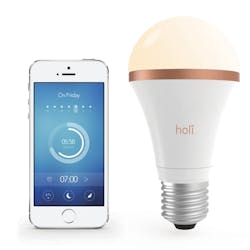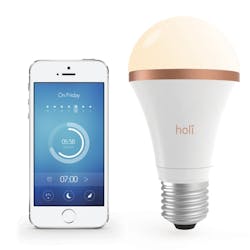Introduced at the Consumer Electronics Show, a tunable LED-based lighting product works with smartphone apps via Bluetooth to encourage rest at night and a gentle awakening experience in the morning.
A European startup company called Holi used the International Consumer Electronics Show (CES) to launch the Bluetooth-based, SleepCompanion LED-based lamp and smartphone software intended to help people get a better night's sleep. The tunable lighting design delivers relaxing light at night and gradually increases light levels in the morning to gently awaken the user. Moreover, the smartphone app can gather data on sleep patterns and the local environment when paired with other wearable smart devices.
Holi hasn’t provided full details on the light-output capabilities of the new lamp beyond saying that it can produce "precise light wavelengths that are needed by the body to sleep and wake up naturally." The company did say that it uses 20 individual light sources, and that would imply tunable-white capabilities and perhaps some ability to deliver colors.
The lamp uses the Bluetooth link to pair with a SleepCompanion smartphone app (Apple or Android) for control. The design is based on the concept that the body clock is set by the natural daylight/dark cycle that controls the human circadian rhythm.
The app includes a nighttime tunable lighting program that synchronizes the output based on the hour of the day to "match the melatonin-driven circadian rhythms." We assume that the program both changes the CCT to warmer levels and dims the light as it gets later at night to boost melatonin production.
The morning program reverses the sequence, awakening a person with slowly elevated light levels as opposed to an alarm clock. The theory is a reduction in melatonin levels that can boost alertness as the body is exposed to light.
The concept sounds interesting, although it's far from the first product to target what is often called human-centric lighting (HCL) — or tunable lighting intended to enhance human wellbeing or boost productivity. The press release that Holi issued does step over the line in terms of claims of effectiveness. The release states that "SleepCompanion is a clinically proven lighting solution." In fact, the medical community is still trying to clinically understand and document how light affects non-visual systems in humans. We covered that ground in an interview in a recent issue of LEDs Magazine.
Still, there is mounting evidence that tunable lighting can be positively deployed in HCL applications. As we covered in a recent column, Dr. Steven Lockley of Harvard University is encouraging use of light therapy while research continues. For more information on HCL, catch our free webcast scheduled for January 13, 2015.
Back to the Holi product, the data-gathering aspects are also interesting. The company said that the app can monitor and help analyze sleep quality. For example, it can track data such as ambient light, ambient noise, and sleep quality using sensors on the smartphone. It can also gather data such as temperature, humidity, calories burned, and other items when paired with a wearable device such as the many fitness-oriented wearable products on the market that work with smartphones.
As mentioned earlier, control of the SleepCompanion lamp is via Bluetooth. We've regularly questioned how appropriate Bluetooth is for networked tunable lighting applications, such as with the recent announcement of the Elgato lamp. Our question is over the fact that Bluetooth links are short range and only active when the smartphone is in range. In the SleepCompanion case, however, you would only use the lamp when the controlling device is present locally to the lamp. Moreover, Bluetooth is key to connecting with the wearable devices that can be used for data gathering.
Holi says that it will sell SleepCompanion for $99. The company says that it is available now on the company website and will be in stores starting in February.







